Text
Ultra Femininity: The Virgin Suicides
TW: suicide, mental health, sexualization and sexual behavior
The Virgin Suicides, Jeffrey Eugenides’ 1993 debut fiction novel. Set in Grosse Pointe, Michigan, in the 1970s, the story follows the lives of the Lisbon sisters; five beautiful, mysterious, trapped, and ultimately cursed sisters: Cecilia (13), Lux (14), Bonnie (15), Mary (16), and Therese (17). The story is told through the perspective of an anonymous group of adult men, who are reflecting on their eye-opening adolescence and the girl’s suicides. The novel has a 1999 film adaptation of the same name directed by Sofia Coppola.
The Virgin Suicides is a tale of young teenage girls living through the examination of the male gaze, and their perspective to what the American teenage girl should be. In The Virgin Suicides, and in American culture, girlhood and beauty are dictated by the male perspective which has no room for anything that cannot be sexualized.
Spoilers for The Virgin Suicides film and novel ahead.
THE EMBODIMENT OF AMERICAN CULTURE AND AMERICAN BEAUTY
The Virgin Suicides takes place in a small town in Michigan, the picture of the post-war American suburban dream. The Lisbon girls are keepsakes, and sex symbols, but also figures of the boy’s imagination. They’re the embodiment of what American beauty should be–young, thin, blonde, alluring, and sexy, but not in a “used way.” Cecilia is dubbed “the first to go” with her odd aura. Bonnie’s description is none other than an opportunity to point out her mismatched and crooked teeth, and her “nun-like” features. Mary is known for her widow’s peak, and the small hair above her upper lip. Therese was said to be clumsy, with her “heavier face” and her “cheeks and eyes of a cow.” Lux was the only sister out of the five to meet the boy’s expectations and gaze, and she “radiated health and mischief” and was teasingly playful and capturing. The perfect American girl should be fresh and pure, but also somewhat sexually experienced, but virginal. Lux was the light of the Lisbon sisters, and the true embodiment of what an American teenage girl should be.
Grosse Pointe, Michigan in the 1970s is the picture of the American dream. A child-friendly religious neighbourhood, a beautiful yet mundane home, and simple, alluring teenage girls that would never dream of losing their virginities until marriage. This is interrupted when thirteen-year-old Cecilia attempts suicide in the bathtub. She is found in time to save her short life, but her suicide in both the novel and film adaptation is portrayed as beautiful, with words describing how her naked and “budding” body looked while she bled, and how the scene is portrayed on screen as enchanting and magnetic, rather than disturbing. This is a perfect example of how the Lisbon girls are portrayed; through their beauty and girlhood. Girlhood in The Virgin Suicides is beguiling and alluring and seductive, with brazzers dangling on top of headboards, and half-used lipsticks next to childhood tiaras. Here, girlhood is not messy, or dark, ordreary, nor is it filled with depressive thoughts, because these things do not appeal to the male gaze the girls are watched through.
Girlhood is not always beautiful, and it is not something to be picked apart by those who do not understand it.
SOCIETY’S OBSESSION WITH TEENAGE GIRLS: WHAT A TEENAGE GIRL SHOULD BE
“On the morning that the last Lisbon daughter took her turn at suicide–it was Mary this time–the two paramedics arrived at the house knowing exactly where the knife drawer was, and the gas oven, and the beam in the basement from which it was possible to tie a rope.”
The story of the Lisbon sisters is not their own–as it is told from the perspective of the boys across the street, narrating the story as adults. The girls are portrayed almost as creatures; laughing, dancing, teasing, mysterious, and curious about the world. As described in the novel, and portrayed on screen, the girls live in a beautiful mess; canopies over their beds, blankets draped over their floors, brazzers hung from crosses on the walls, and half-used lipstick tubes perfectly placed. The boy’s perspective sexualizes and glorifies these young girls–as they don’t know them, and with their fate, they never will.
The girls are figments of the boy’s imagination. Yes, the girls are very much real, but through the boy’s eyes, they’re pure, yet sexualized creatures that are a mystery to them. The girls are something that the boys can desire and yearn for in their small, white suburban town.
The Lisbon girls represent what society and the male perspective think the girls should be–beautiful, yet simple, mysterious, but not off-putting, desired, but not out of reach. The boys do not really want to know the girls–they want to fix their pain, and save them from their overbearing, religious mother, and their good for nothing father all without realizing that the girls’ lives are not for them to fix, and not for them to save.
THE SEXUALIZATION OF THE TEENAGE GIRL
“He came back to us with stories of bedrooms filled with crumpled panties, or stuffed animals hugged to death by the passion of the girls, of a crucifix draped with a brassier, of gauzy chambers of canopied beds, and the effluvia of so many young girls becoming women together in the same cramped space.”
What else is a girl supposed to do, besides apply layers of crimson lipstick, not for herself, but for the males around her? What else is a girl supposed to cry about, besides losing her music and her touch to teenage culture? What else is a teenage girl supposed to want, besides going to a dance, and to ultimately lose her virginity?
The Lisbon girls are portrayed as innocent–yet ironic in the most teenage girl way, secretly, like they won’t give themselves up if not for a price. They are a part of the boy’s imagination; their sexual imagination, but the girls do not have a perspective to their own body, and their own sexual nature. It is instead in the perspective of the teenage boys, erasing any want, desire, or need the girls may or may not have.
Lux is perhaps the most sexualized out of all the Lisbon girls–as she’s described as beautiful in her tube top that her mother always asks her to cover up, yet rebellious in her habit of chain smoking in her bathroom since the age of twelve. In the novel, Lux has a habit of writing boy’s names on her underwear in place of lacey, girl-like lingerie. In the film, we see Trip’s name written on Lux’s underwear–as if it’s giving a hint to Lux’s budding sexuality, and foreshadowing what’s to come in the football field. Lux is the ultimate girl–pure, yet sexually experienced, soft, but rough around the edges, teasing, yet arousing, and playful.
The Lisbon’s girls' suicides are told from the boy’s perspective, narrated adult years later. Instead of the suicides being a defining moment in the girls’ lives, it's a defining moment in the boys’. They’re recreating the girls’ lives through Cecilia’s stolen diary, girlhood memorabilia, and word of the mouth remembrance from the girl’s lives. They never understand that the girls are their own entity outside of their perspective, and that they do not solely exist for their viewing and sexualization.
The readers and viewers never get to know the girls from their perspective. Like the adolescent boys, the readers are oblivious observers to their girls’ real pain and suffering. The readers receive a vague explanation of this agony, which was dubbed “the first to go.”
‘“What are you doing here, honey? You’re not even old enough to know how bad life gets... “Obviously doctor, you’ve never been a thirteen-year-old girl.”’ Cecilia doesn’t explain the suffrage of being a thirteen-year-old girl, as the experience cannot be understood by the boys and their tendency to put the Lisbon girls on a beautiful and out of reach pedestal of teenagehood and girlhood. Girlhood, to the boys, is alluring and dazzling, but to the Lisbon girls, the readers never know.
“It didn’t matter in the end how old they had been, or that they were girls. But that we had loved them, and that they hadn’t heard us calling, still do not hear us calling them out of those rooms. Where they went to be alone for all of time.”
The boys, in the end, are calling to themselves. For the Lisbon girls, Cecilia, Lux, Bonnie, Mary, and Therese could not hear them in death or in living.
#TheVirginSuicides#the lisbon sisters#thelisbongirls#1999film#novel#jeffery eugenides#SofiaCoppola#cecilia lisbon#lux lisbon#bonnielisbon#marylisbon#thereselisbon#novel adaptation
124 notes
·
View notes
Text
Marie Antionette (2006)
Starring Kirsten Dunst, Jason Schwartzman, Asia Argento, Judy Davis, Rip Torn, Rose Byrne, Molly Shannon, Shirly Henderson, Marianne Faithfull, Jamie Dornan, Steve Coogan, Danny Huston, Sebastian Armesto, Al Weaver, and Mary Nightly
Screenplay by Sofia Coppola and Antonia Fraser
Directed by Sofia Coppola
Cinematography by Lance Accord
I do not own any of the pictures posted.
SPOILERS AHEAD

Marie Antionette is a historical drama period film written and directed by Sofia Coppola. Based on the life of the so-called “Queen of Debt” Marie Antionette in the years leading up to the French Revolution, the film follows her life before and during her life in crumbling France.

Fourteen-year-old (I know, fourteen) Marie Antionette is the beautiful, but culturally naive Archduchess of Austria, the youngest of Maria-Theresa’s daughters. As she is the only one left of her sisters that is not married, she is sent by her mother to marry the Dauphin of France, the future Louis XVI of France, to create an alliance between the two countries.
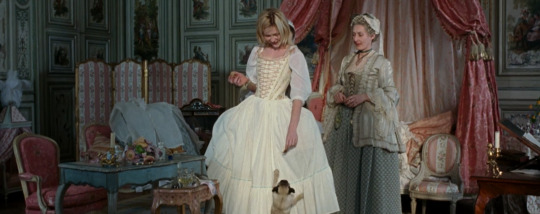
Marie travels to France and relinquishes all her connections to her home country, including her pet pug. She meets Louis XVI, and they are married at once. They are encouraged to produce an heir to the throne, but the next day, it is reported that “nothing happened” on the wedding night.
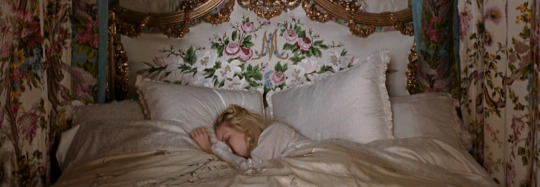
As the film passes, Marie concludes life at the court of Versailles stiffening. Her husband’s courtiers disdain her as a foreigner, blaming her for not producing an heir, although the fault lands within her husband, as the marriage remains unconsummated for an inordinate amount of time.
The French court continues to gossip about Marie, as she constantly ignores ritualistic formality among them. Marie also refuses to meet or even speak to Jeanne Becu, Comtesse du Barry, the King’s mistress.
As the years pass, Marie Theresa continues to write her daughter, giving advice on how to seduce Louis XVI. Marie’s attempts to consummate with her husband remained unfulfilled, and the marriage remains childless, while France remains heirless.
Marie spends most of her time buying extravagant clothes, gambling, and partying. After a masquerade ball attended by both Marie and Louis, they return to find that the King was dying of smallpox. He dies, and Louis, 19 is crowned King of France, while Marie, 18, is crowned Queen.

Marie’s brother, Joseph II of the Holy Roman Empire comes to visit and counsels her against her lavish spending and partying, which she ignores. He also meets with Louis at the Royal Zoo and explains to him how the “mechanics” of sexual intercourse work in terms of “key making,” as locksmithing keys are his favorite hobby.
After the King and Marie have sex for the first time, ultimately consummating their marriage. Nine months later, Marie gives birth to a daughter, Princess Marie Therese Charlotte of France. As the child matures, Marie begins to spend much of her time at the Petit Trianon, a small chateau in the park of Versailles. She later begins an affair with Axel Fersen, who she met at the masquerade ball.

France’s financial crisis worsens, and the food storages and riots increase, and by this point, her public image has completely deteriorated. Due to her lavish spending and lifestyle, she has earned herself the name “Madame Deficit.”

As she matures, she focuses less on her lavish lifestyle and more on her family, making financial adjustments as needed. A year after her mother’s death, she gave birth to a son, Louis-Joseph, the Dauphin of France. She also gives birth to another son, Louis Charles, and another daughter, Princess Sophie, who dies a month after her first birthday.

As the French Revolution erupts and many storm Versailles, the royal family resolves to stay in France, which ultimately leads to their inevitable downfall in history. Rioting Parisians force the family to leave Versailles for Paris, and the film ends with the royal family’s transfer to Tuileries. The last image is a shot of Marie’s bedroom in Versailles in pieces and destroyed by angry rioters.

There’s something just so beautiful about Sofia Coppola’s films. I think Coppola does a fantastic job of humanizing historical figures in the film, whether they deserve it or not. Although, I will say, Marie Antionette plays more like a music video than I believe a historical film, and I understand the historical criticisms of the film, due to its absence of political context.
I think the film is the world in Marie Antionette’s perspective, as she is very naive politically, socially, and culturally. Intermixing the Bow Wow Wow’s “I Want Candy” while showcasing a montage of cakes, champagne, and shoes, describe what Marie Antoinette saw royalty as, nothing less than a shopping spree, rather than leading the people of France out of ruin.

There’s something to be said about the little dialogue in Coppola’s films. I’ve noticed this in certain films aside from Marie Antoinette, like in The Virgin Suicides or The Beguiled. I think she does this completely on purpose. In these films, the setting tells a story more than the dialogue does. The beauty and lavishness, but also the mystery behind all of it, is more important than the characters' interaction with each other. In Marie Antionette in particular, we see many interactions between characters, but they are non-confrontational rather than belligerent, with actions such as slide-glances or whispers. Coppola does not allow dialogue to interfere with the setting, or event storyline for that matter, which I think as a director, must be very difficult to do.

There’s also something to be said about the subtle changes in coloring in Coppola’s films. I noticed this in The Virgin Suicides as well. After a dramatic event in her films, the coloring deteriorates into a blue-green tint. In Marie Antoinette, this is noticeable when she and the King fall out of favor with the people of France.
The film in itself masks the problems proceeding to the French Revolution. The clothes, the parties, the affairs, all mask the real issues retaining to the backbone of the French Revolution. In the modern-day soundtrack, even one could argue the so-called “humanistic” view of Marie Antionette would be considered hiding behind the truth.
Marie Antoinette is fun, lively, but I would argue, not historically accurate. Even Coppola herself stated that she was interested in showing “the real human behind the myths.” Which, in perspective, does exactly that. It showcases Marie Antoinette’s spirit, and her naivety which leads to her inevitable downfall, and the inevitable downfall of France’s royal empire.
So, is Coppola’s version of history correct? Should we sympathize with a young Marie Antionette? Or was the world done with powerful monarchs?
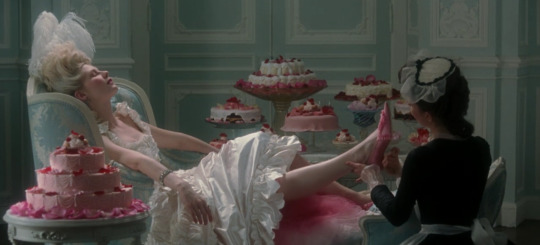
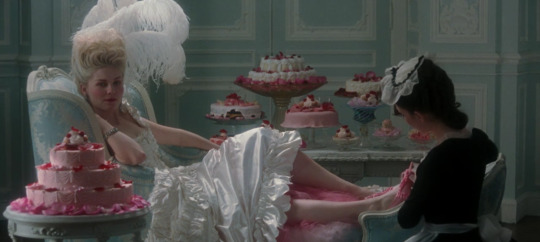
#marie antoinette#drama#sofia coppola#sofia coppola films#sofia coppola movie review#film#2000s films#filmreview#female directed movies#female filmmakers#movies#moviereview#americanmovies#period drama#2000s movies#2006#french revolution#american revolution#timepiece#time period#time period film
54 notes
·
View notes
Text
The Twilight Saga: Breaking Dawn–Part 2
Starring: Kristen Stewart, Robert Pattinson, Taylor Lautner, Nikki Reed, Ashley Greene, Kellan Lutz, Jackson Rathbone, Peter Facinelli, Anna Kendrick, Elizabeth Reaser, Billie Burke, Michael Sheen, Dakota Fanning, Jamie Campbell Bower, Christian Serratos, Chaske Spencer, Mackenzie Foy, Rami Malek, Christopher Heyerdahl, Alex Meraz, Bronson Pelletier, Julia Jones, Booboo Stewart, Noel Fisher, Sarah Clarke, and Jodelle Ferland
Screenplay by Melissa Rosenberg
Directed by Bill Condon
Cinematography by Guillermo Navarro
I do not own any of the pictures posted.
SPOILERS AHEAD
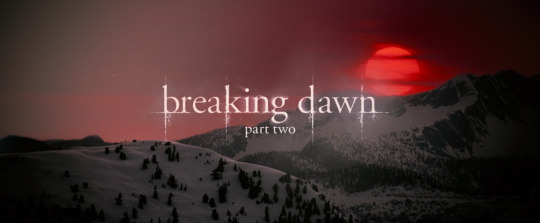
Bella has just awoken from her human-to-vampire transformation and is introduced to her daughter Renesmee. The Cullens and Jacob stay nearby, and Jacob seemingly acts possessive towards Renesmee, and Bella learns that he imprinted on her. Meanwhile, Bella’s father Charlie has been trying to contact the Cullens for updates on Bella and her health. Carlisle soon comes to believe that they need to leave Forks to protect their identities, and Jacob, desperate not to lose Renesmee, visits Charlie to inform him about Bella. He tells him that Bella is alive and well, but had to change in order to get better. He also tells Charlie that he doesn't live in the world he thinks he lives in, revealing his wolf form to Charlie. Charlie then visits the Cullen house and meets Renesmee, and Bella and the Cullen family are able to stay in Forks.
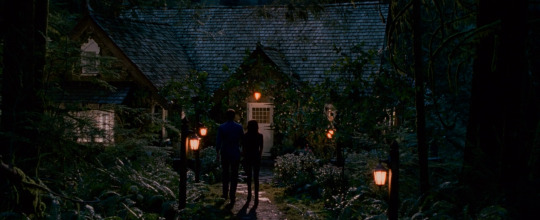
Carlisle is monitoring Renesmee’s rapid growth over the course of a few months. When they go to the woods for an outing, Irina sees Renesmee from a distance and assumes that she is an immortal child without asking any questions. Immortal children are vampires changed in childhood who often destroyed villages and towns because they could not be restrained or controlled. Immortal children were executed and outlawed, as well as the parents who created them. A bitter Irina goes to the Volturi to report what she has seen, and Alice has a vision of the Volturi and Irina coming to kill the Cullens and instructs them to find as many witnesses to vouch that Renesmee is not an immortal child. Alice and Jasper leave to try and find their own witnesses, while the others begin to summon various people to vouch for the Cullens that they do not have an immortal child.
Some of these witnesses include the Denali family. Eleazar, a member of the Denali family, discovers that Bella has a special ability that protects her from Edward’s mind-reading. Even when she was human, she had a powerful mental shield protecting her from many vampire gifts, which translated into her being able to protect others from vampire powers now that she is immortal.

Some of Cullen's potential witnesses are attacked, and Carlisle and Edward realize that they may have to fight Volturi. Their remaining witnesses agree to stand with them against Volturi. The Volturi soon arrive prepared for battle led by Aro, who is eager to obtain the vampiric gifts the Cullens have as part of his guard. Before any violence begins, Alice and Jasper approach Aro, and Alice shares her vision with him of battle, which would result in heavy casualties on both sides, including Aro’s and Carlilse’s death. Aro believes her vision, giving them both a chance to reveal their witness, Nahuel, who is half-human and half-vampire, just like Renesmee. Nahuel proves that he is not a threat, ensuring that Renesmee isn't either. The Volturi leave, explaining that there will be no battle.
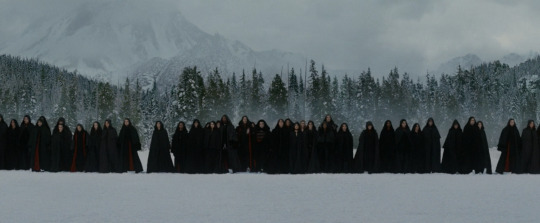
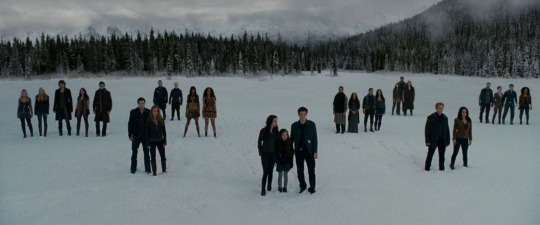
Now back at the Cullen house, Alice has a vision of the future, seeing Bella and Edward and Jacob together and a fully matured Renesmee also together. Edward reads Alice’s mind and is relieved to find that Jacob will always protect Renesmee. Now alone in the meadow, Bella pushes her mental shield away and finally allows Edward to read her mind, showing him every moment they spent together. The film franchise ends with Bella tells Edward that “nobody has ever loved anybody as much as I love you” and with that, the film franchise finally comes to a close, with Bella and Edward together forever in their own vampire universe.
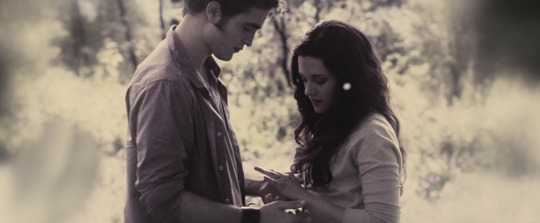
Breaking Dawn–Part 2 captured and finalized the Twilight saga, throwing a few twists and turns into the storyline. Now, I will admit, some of the dialogue seems a bit out of place when compared to the franchises previous films, but the overall feel remains the same. Breaking Dawn–Part 2, if anything, ties up the series without leaving any loopholes in an action-packed, bone-chilling way.
We see the new Bella right at the beginning of them, which I believe is one of the best character developments I’ve ever seen. She’s changed, but not in a way that doesn't seem unrealistic (that is, if you consider vampires, werewolves, and hybrids of some sort realistic.) She, like the Cullens, can run from place to place instantaneously, sees nature in great detail, and has a daggering taste for blood.
Vampire Bella is not someone I would describe in the same way I would describe human Bella. Human Bella is seclusive, insecure, and sensitive. Vampire Bella is more confident, and more herself. Human Bella is more of a daydreamer, and vampire Bella is more realistic, and excited to live her life as an immortal.
Spending the last week and a half watching, reading, and analyzing Twilight and Twilight saga reviews, there is one thing that I’ve noticed. Bella, and Kirsten Stewart, who plays Bella, received generally negative reviews from critics. Stewart played Bella exactly how she was written, both human and vampire. Bella, as a character, is not very relatable or self-actualized, which is exactly how Stewart played her to be.

Now, back to the film and the saga as a whole. Watching Breaking Dawn–Part 2 is thrilling, especially in the later part of the movie. I know what’s going to happen when the Cullens and their witnesses fight Volturi. Nonetheless, I was still at the edge of my seat and holding my breath for these characters. Watching many of these beloved characters die, but not die, even though I knew what was going to happen, was heart wrenching and thrilling.
Overall, I believe this film to be the perfect and bittersweet ending to the Twilight saga. Built up from Eclipse, I think it gave many what they wanted in an ending. Twilight, I believe, will always have an important place in pop and teen culture, and will always be something that many, including myself, reminisce on. Now, I believe that it’s getting the recognition that it deserves because society has moved past the point of hating something because teenage girls love it. I think that it’s okay to like Twilight, it’s okay to like things that are not deemed as classical or “good” literature, and it’s okay to like something simply because it's enjoyable.
Breaking Dawn–Part 2 perfectly closed the series, but I don’t think the series will ever fully be forgotten or deemed unimportant by societal standards. I think, in an essence, teenage girls, or everyone else for that matter, will always remember the gut-wrenching, thrilling, bone-chilling, and romantic, vampiric series that is Twilight.
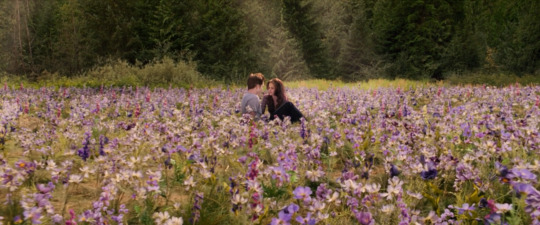
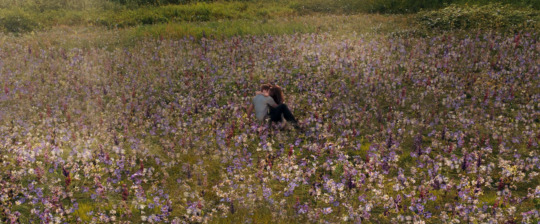

#twilight#thetwilightsaga#breaking dawn#bella swan#edward cullen#alice cullen#rosalie cullen#emmett cullen#jasper cullen#2000s movies#2000s childhood#2000s nostalgia#2000s web#2010 film#early2010s#2010s movies#2010a#2010s aesthetic#filmreview#film#moviereview#movies#twilight movies#twilight moodboard#stephanie myer#kirsten stewart#robert pattinson#taylor lautner
5 notes
·
View notes
Text
The Twilight Saga: Breaking Dawn–Part 1
Starring: Kristen Stewart, Robert Pattinson, Taylor Lautner, Nikki Reed, Ashley Greene, Kellan Lutz, Jackson Rathbone, Peter Facinelli, Anna Kendrick, Elizabeth Reaser, Billie Burke, Michael Sheen, Dakota Fanning, Jamie Campbell Bower, Christian Serratos, Chaske Spencer, Mackenzie Foy, Rami Malek, Christopher Heyerdahl, Alex Meraz, Bronson Pelletier, Julia Jones, Booboo Stewart, Sarah Clarke, and Jodelle Ferland
Screenplay by Melissa Rosenberg
Directed by Bill Condon
Cinematography by Guillermo Navarro
I do not own any of the pictures posted.
SPOILERS AHEAD

Breaking Dawn–Part 1 begins a few months after the events of the previous film, showing us many of Bella’s loved ones receiving invitations to her and Edward’s marriage. We see Jacob receive an invitation, and as a result, he turns into a wolf and skips town.

The night before the wedding, Bella has a dream of the event with all her friends and family there, and like her, wearing white. The dream ends with both her and Edward covered in blood, with them standing on a the ever-growing pile of Bella’s dead loved ones from bites of a vampire.
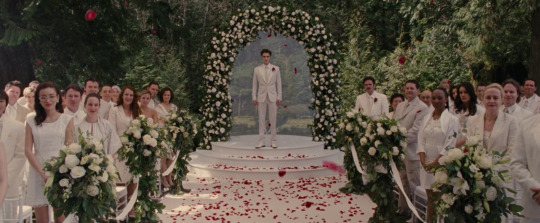

After this dream, Bella, with the help of Alice and Rosalie, gets ready for her wedding. She enters wearing a simple-yet beautiful white fitted gown to a a crowd full of her family and friends, with Edward waiting for her at the end of the isle. They marry, and all is to celebrate.


During the reception, Jacob returns after he had skipped town after receiving an invitation for the wedding. Bella and Edward happily exchange their vows and are married. Bella is thrilled to see Jacob, and the two share a dance in the woods. Bella admits that she and Edward plan to consummate their marriage on their honeymoon while she is still human, and Jacob becomes furious, knowing that this could possibly kill her. Sam and the other pack members restrain Jacob before he phases, and they leave.
After the wedding, the now married Bella and Edward spend their honeymoon on Isle Esme, and they have sex for the first time. The morning after, Edward realizes that Bella has numerous bruises and is upset at himself for hurting her, and vowed to not have sex again until she is a vampire.
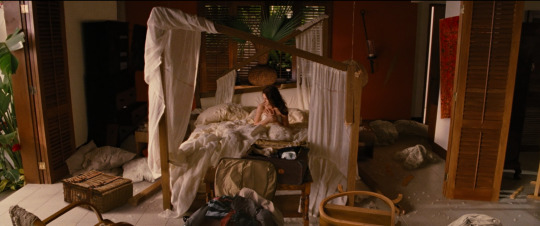
Two weeks after their wedding, Bella vomits after waking up and notices that her period is late. Alice called Bella to ask if she was alright, as she saw a vision of something happening to Bella. She then talks to Carlisle, and Bella tells him that she believes that she’s pregnant. Edward is distraught because he knows that it’s highly unlikely that a human will survive giving birth to a vampire baby. Edward tells Bella that Carlisle needs to remove the baby, and Bella refuses, wanting to keep the child. She confides in Rosalie, and she acts as her bodyguard. They fly back home to Forks, Washington, and the baby rapidly grows.
Jacob rushed over to Cullen's house to see Bella. Bella is now heavily pregnant and is pale and underweight. Jacob is upset by Bella’s daily health and says that Carlisle should terminate the pregnancy to save Bella. Bella ignores both Carlisle's medical advice and Alice’s visions of her pregnancy, allowing the pregnancy to therefore progress. Bella soon realizes that the baby is craving human blood and she begins drinking human blood supplied by Carlisle from the local hospital. Bella’s health improves and the baby grows at an alarming rate, and as half-vampire, the fetus’s growth is accelerated more than a human one. Edward’s dislike for the baby lessens when he begins reading the baby’s thoughts, and Bella and him share a tender moment with their unborn child.
Then, Bella’s backbone breaks, and she collapses. Edward and Jacob realize that Bella cannot cope with the pregnancy, so Edward, Jacob, and Rosalie begin a C-section on Bella. Rosalie begins the procedure as Carlisle is out getting blood, but due to her hunger for human blood, Bella’s blood tempts her greatly. Jacob stops her and Edward picks up the blade and finishes the procedure. The morphine that Bella was given has not spread yet, so the pain she is experiencing is excruciating, and she falls unconscious.
After Bella wakes up and sees her healthy daughter, she chooses the name Renesmee, a combination of both her and Edward’s mother’s names. Before anyone knows it, her heart stops beating. Jacob desperately tries to resuscitate her with CPR while Rosalie takes the baby away. Edward then injects Bella’s heart with vampire venom in order to transform her, but it appears to be futile as Bella remains completely lifeless.

Panicked, Edward begins chest compressions. Jacob tells him that he won’t kill him, as it will be greater punishment for Edward to spend eternity knowing he was the reason for Bella’s death. Seth and Leah tell the pack that Bella didn’t survive the birth, and Jacob goes back inside in an attempt to kill Renesmee, as he believes that she is the reason for Bella’s death. After locking eyes with Renesmee, Jacob sees all the future versions of her and decides not to kill her, but imprints on her instead.
When the werewolves learn of Bella’s “death,” they travel to the Cullen’s in an attempt to kill Renesmee, fearing that she is too great of a threat. Edward, Alice, and Jasper defend their home with the help of Leah and Seth, later assisted by the rest of the Cullen family. Edward reads Jacob’s mind, and announces that Jacob has imprinted on Renesmee. The wolves’ absolute law is that they cannot harm anyone who has been imprinted on, so they leave.
Edward’s venom heals Bella, and she is cleansed and dressed. Over the course of a couple days, her bite marks heal, and her broken back and chest repair. Finally, the transformation is complete, and when her eyes open, they are blood red.
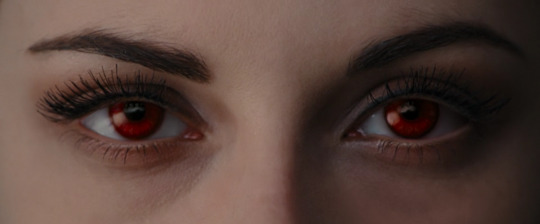
In the mid-credits, Aro, Marcus, and Caius receive a letter from Carlisle announcing that they have a new member of the Cullen family. Aro informs the two that their feud is not over yet, as they still have something that he wants.
Breaking Dawn–Part 1 translates key events from its source material onto its screen. The film is followed with romance, passion, and of course, none other than Bella and Edward’s wedding, honeymoon, and long-awaited consummation.
When compared to Eclipse or even the first installment of the series, Breaking Dawn–Part 1 gets pretty underwhelming after Bella and Edward’s honeymoon. I feel like this big moment between these two characters was built up to a point where me, along with the millions of other teenage girls watching the series, were disappointed. I knew what was going to happen, Edward would somehow hurt Bella (destroying what seems to be every piece of furniture in the process) and still give off this “I’m dangerous, stay away from me” vibe.
That being said, Breaking Dawn–Part 1 and Part 2 come from the same source material, so it's understandable that one feels a little more underwhelming than the other. The most excited I got when watching this film (after the honeymoon scene, of course) was when Bella woke up from her seemingly dead but not dead vampire transformation, and her eyes were blood red. There’s something about watching a character completely transform into something else. Bella, for three movies prior, was written to be sweet and demure, and give off this “damsel in distress” sort of feeling. But when she wakes up with blood red eyes, it's saying, “Everything now, as you know it, is about to change.”
I could only imagine seeing this film in theaters on opening night. Sadly, I was eight and a quite bit too young to see any of the installments in the series. However, I remember that the series was everywhere. You could not escape the Twilight craze, or the teen romance vampire craze, for that matter. Breaking Dawn–Part 1 changed the course of the whole series. We get the excitement, but dangerous, and sometimes bothersome Cullen clan dealing with a new matter–Bella Swan becoming a vampire.
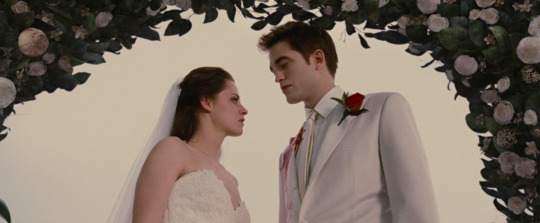



#twilight#thetwilightsaga#breaking dawn#bella swan#edward cullen#jacob black#alice cullen#emmett cullen#rosalie cullen#jasper cullen#2000s movies#2000s childhood#2000s nostalgia#2000s web#2010 film#early2010s#2010s movies#2010s aesthetic#2010s icons#2010 childhood#2010 nostalgia#kirsten stewart#robert pattinson#taylor lautner#film#filmreview#movies#moviereview#2000sfilms#2010sfilms
48 notes
·
View notes
Text
The Twilight Saga: Eclipse (2010)
Starring: Kristen Stewart, Robert Pattinson, Taylor Lautner, Nikki Reed, Ashley Greene, Kellan Lutz, Jackson Rathbone, Peter Facinelli, Anna Kendrick, Elizabeth Reaser, Billie Burke, Michael Sheen, Dakota Fanning, Jamie Campbell Bower, Christian Serratos, Bryce Dallas Howard, and Chaske Spencer
Screenplay by Stephanie Meyer and Melissa Rosenberg
Directed by David Slade
Cinematography by Javier Aguirresarobe
I do not own any of the pictures posted.
SPOILERS AHEAD
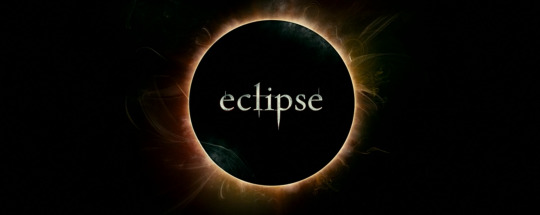
Eclipse begins with the vampire Victoria attacking Riley Biers in hopes of creating an army of newborn vampires in order to get her revenge on Edward for killing her mate James. Back in Forks, Edward and Bella discuss the complications of becoming a vampire, as well as marriage, to which Bella expresses aversion to because she, now eighteen years old, is so young. Edward, however, refuses to turn her into a vampire until they are married, with his argument being that she would miss various human experiences, including her high school graduation.
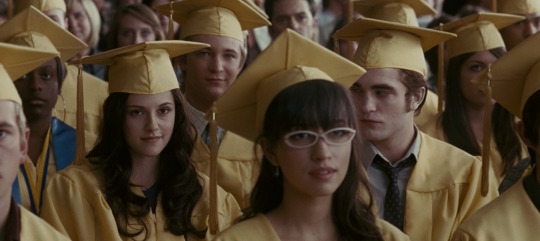
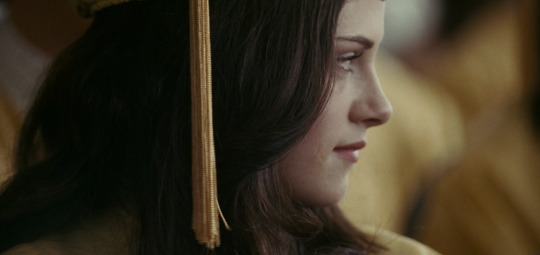
Charlie Swan then begins to investigate the disappearance of Riley Biers, and Edward suspects that the disappearance was caused by newborn vampires. His suspicion is furthered by Riley’s intrusion into Bella’s room.
Edward now fears for Bella’s safety, to which Bella states that Jacob and his wolf pack would never hurt her, and Edward is ultimately unconvinced. Bella goes to La Push to see Jacob, returning unharmed. Jacob confesses that he is in love with Bella and forcibly kisses her. Furious, she attempts to punch him and sprains her hand in the process. Edward finds out and threatens Jacob, telling him to only kiss Bella if she asks him to. Bella then invites Jacob and his pack members to her graduation party, but when Jacob apologizes for his behavior, she forgives him.
Alice sees a vision of a newborn army attacking Forks led by Riley Biers. Jacob, Quil, and Embry overhear this, leading to an alliance between the Cullens and the pack. After this, the Cullens and the pack agree to meet to train and discuss strategies. During training, Jasper tells Bella that he was created by a vampire named Maria to control a newborn army. He despised his original existence upon meeting Alice and joined the Cullens in order to be with her.
Despite her reluctance to marry so young, Bella realizes that spending eternity with Edward is more important to her than anything else and agrees to marry him. Edward and Bella then hid in the mountains to hide from the newborns. During the nighttime, Bella overhears a conversation between Edward and Jacob where they temporarily put aside their differences toward one another. Jacob overhears Edward and Bella discussing their engagement and takes off. Bella then desperately asks him to kiss her, realizing that she has fallen in love with him. Edward finds out about the kiss but is not upset, and Bella says that she loves him more than Jacob.


When Victoria appears, Edward kills her and Seth kills her accomplice, Riley. The Cullens and the wolf pack destroy her army, with Jacob facing injuries after saving Leah Clearwater from a newborn. Several members of the Volturi arrive to deal with the newborn army. They also notice that the Cullens are protecting Bree Tanner, who had refused to fight and surrendered to Carlisle and Esme. Jane torchers Bree to collect information, instructing Felix to kill her. Jane then notices that Bella is still human, but the Cullens inform her of Bella’s transformation date.
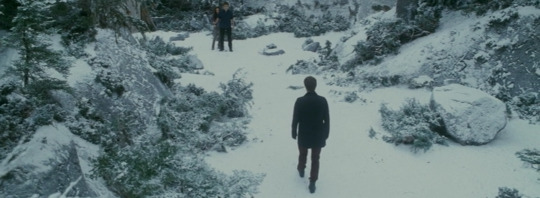
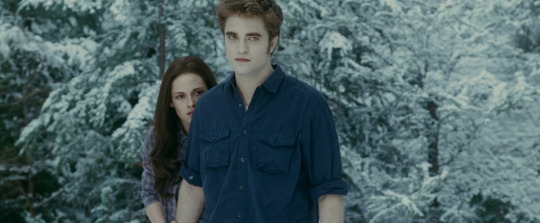
Bella then visits Jacob to tell him that she is in love with Edward and that she has chosen to be with him. Although he is upset by her choice, he agrees to stop trying to come between them.
The film ends with Bella and Edward in their meadow, where she agrees to marry him and then be transformed into a vampire. She explains that she is not normal and will never be and that she has felt out of place her entire life, but she feels stronger and complete when she is with Edward. The film ends with Bella and Edward deciding to tell Charlie about their engagement.
Now, here’s my summary of Eclipse: Bella, a sweet and mild-tempered girl is forced to choose between two tall, dark, and handsome men while also trying to fight off a newborn vampire army led by the redhead antagonist Victoria.
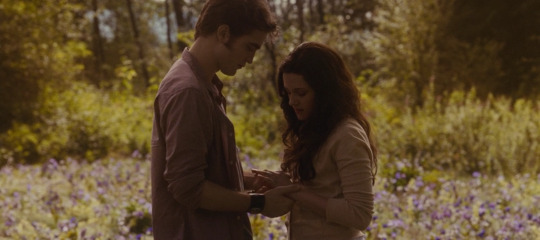
Now, I will say that Eclipse is ten times better than New Moon, but it centers around dragged out conversations between Bella and Edward, Edward and Jacob, Jacob and Bella, and so on. This movie really reminds the viewer that there is a love-triangle in Twilight, (although, I think it’s pretty evident as to who Bella will end up with, but that’s just me.)
Another thing I want to talk about in this movie is the idea of sex and traditionalism. Which, I think, is taken to a whole new level that I was uncomfortable with while watching the film. Meyer is a prominent member in the Church of Jesus Christ and Latter Day Saints, so it’s no surprise that religion influences Twilight. As you may have noticed, there is no drug or alcohol usage, or sex, for that matter, which isn’t my problem with it.
My problem with it is that it’s made to be this be-all and all-right thing, and that the act before marriage would take away Bella’s purity. Eclipse is the film that I feel completely pushes gender stereotypes to the next level, more than its procedures. I will say, I do believe that at some points Meyer’s Mormon theology in the story is complex and perfectly fits in, but this was different. The topic of sex in both the Twilight novels and the films have always made me uncomfortable, mostly because I think Meyer builds the act up as being such a big thing that has to wait until after marriage, which, in most cases (in modern times, at least) is not the truth.
I feel that if you’re a Mormon writing about sadistic vampires and shape-shifting wolf men, then you have to be comfortable with the truth of sex. Most teen romances do not portray sex accurately. I know that. But Twilight as a whole, especially Eclipse, pushes the harmful idea that having sex means giving up purity and goodness, which is not realistic, nor is it the truth.
However, entertainment wise, Eclipse was more fast-paced than both New Moon and Twilight, and had more of an interesting and easier to follow dialogue. This film was definitely not boring. Action happened at every turn, and I believe that it kicked off the storyline for Breaking Dawn–Part 1 and 2.
Overall, I believe that Eclipse was the kickoff for the series. Although controversial in my opinion, it was action-packed and full of soapy human-vampire-wolf romance, and for nostalgia purposes, it’s crucially significant.
Overall rating: 7/10
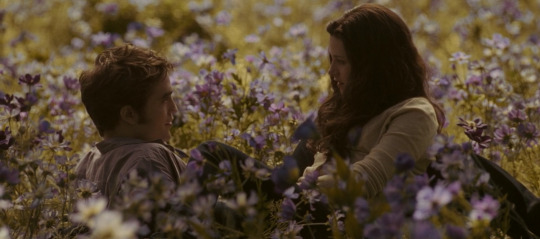
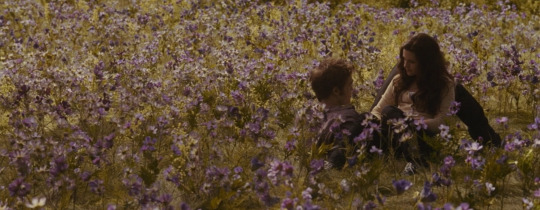
#twilight#thetwilightsaga#twilight eclipse#bella swan#edward cullen#jacob black#rosalie cullen#alice cullen#jasper cullen#emmett cullen#twilight movies#twilight films#filmreview#film#moviereview#movie#movies#2000s movies#2000s childhood#2000s web#2000s nostalgia#2000s#2010 film#early2010s#2010s movies#2000s icons#kristen stewart#robert pattinson#taylor lautner#stephanie meyer
12 notes
·
View notes
Text
The Twilight Saga: New Moon
Starring: Kristen Stewart, Robert Pattinson, Taylor Lautner, Nikki Reed, Ashley Greene, Kellan Lutz, Jackson Rathbone, Peter Facinelli, Anna Kendrick, Elizabeth Reaser, Billie Burke, Michael Sheen, Dakota Fanning, Jamie Campbell Bower, Christian Serratos, Rachelle Lefevre, and Chaske Spencer
Screenplay by Stephanie Meyer and Melissa Rosenberg
Directed by Chris Weitz
Cinematography by Javier Aguirresarobe
I do not own any of the pictures posted.
SPOILERS AHEAD
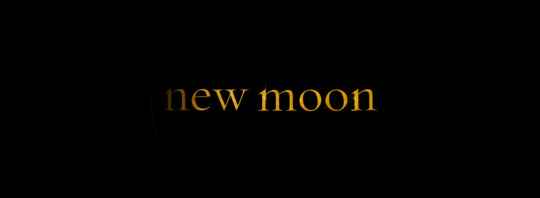
Twilight: New Moon pics up on Bella Swan’s eighteenth birthday. She awakes from a dream where she is an old woman and Edward Cullen, an immortal vampire who happens to be her boyfriend, is forever young. Edward’s family holds a birthday party for Bella at their house, where she opens a gift and receives a paper cut. Because of this, Jasper, Edward’s brother, is overwhelmed by the scent of Bella’s blood and tries to attack her, but is ultimately restrained. Because of this incident, Edward believes that he and his family are putting Bella’s life in danger, and he ends their relationship and his family leaves Forks.


Bella then becomes extremely isolated and falls into a deep depression. Charlie, her concerned father, decides to send Bella to live with her mother in Jacksonville, Florida, in hopes of bringing her out of her depression. She refuses and promises to start to spend more time with her other friends in school.
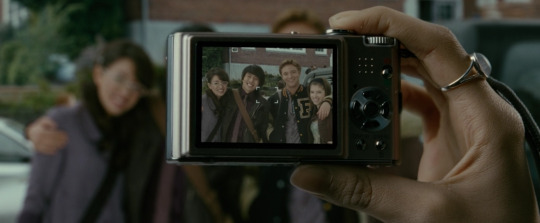
She and her friend Jessica then go and see a movie, where Bella approaches some bikers outside the theater to Jessica’s dismay. This encounter reminds her of an event where Edward rescued her, as she starts to begin seeing images of Edward and hearing his voice. After this event, she realizes that thrill-seeking activities can provoke these images and hearings of Edward.

Jacob begins to help ease her pain by engaging her in activities with him and his friends. Jacob tells Bella that many of his tribal friends obey Sam, who is another Quileute. While attending a movie with Bella and her friend Mike, Jacob experiences a burning fever and becomes visibly upset and leaves. Bella then drives to Jacobs’s house after he avoids taking her calls. Upon arriving, Bella discovers that Jacobs cut his hair and has the same Quileute tattoo on his arm as Sam and the other tribe members. He then warns Bella to stay away from him.
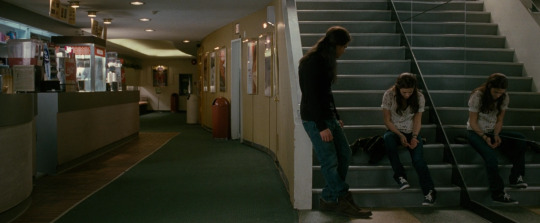
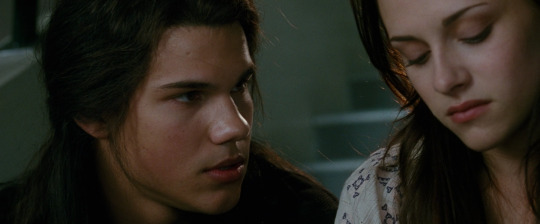
After this encounter, Bella hikes up the mountain that she and Edward frequently visited, and is confronted by Laurent. As he is about to kill her, a wolf pack appears and attacks him. Bella then discovers that Jacob and his other tribe members are werewolves. They are age-old enemies with vampires, though a treaty exists between the Cullen’s and the Quileutes. Jacob and his other pack members are on alert for Victoria, the vampire seeking to avenge her mate James, who was killed by the Cullen’s in order to protect Bella. Jacob then leaves again to adapt to his shape-shifting powers, and Bella is alone, continuing to seek thrill-inducing activities in order to see Edward.
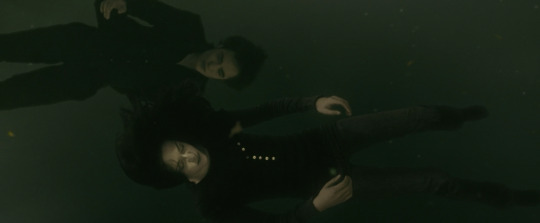
Because of these thrill-inducing activities, Edward believes that Bella has killed herself after Alice has a vision of her jumping off a cliff. Edward is distraught and travels to Italy to ask the Volturi, a coven that acts as the vampiric overlords, to kill him because he cannot do it himself. They refuse his request, and he plans to force their hand by revealing himself to humans at a large festival. Alice returns to Forks and is shocked to discover that Bella is still alive.
Alice then takes Bella to Italy to save Edward, and arrives just in time to prevent him from revealing himself as a vampire. Edward, relieved to see Bella, explains that he only left Forks to protect her and promises to never leave her again.
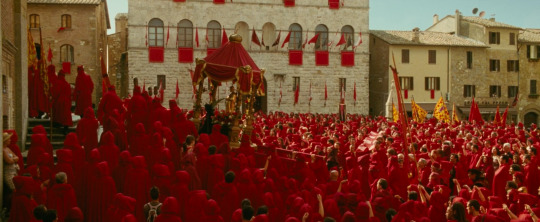
Bella, Alice, and Edward are then taken to the Volturi. Edward defends Bella from Felix, one of the Volturi members, as the Volturi members do not allow humans to confide in vampiric society. Edward is overpowered and almost killed until Bella offers herself in his place.
Volturi, however, is impressed that Bella would be willing to sacrifice her life for a vampire and states that she must be transformed into a vampire or killed because she is aware of their existence. Alice shares her vision of a vampire Bella with Aro, a Volturi elder who is able to read thoughts through touch. Aro decides to let them go after the promise that Bella will eventually be turned into a vampire. After the Cullen’s and Bella return to Forks, she asks them to vote on her becoming a vampire. Only Edward and Rosalie vote no, and Jacob reminds Edward that the treaty between the Cullen’s and the Quiletues will be broken if any Cullen bites a human, to which Bella tells Jacob that it is her decision. Edward then tells Bella that he will change her into a vampire if she marries him.
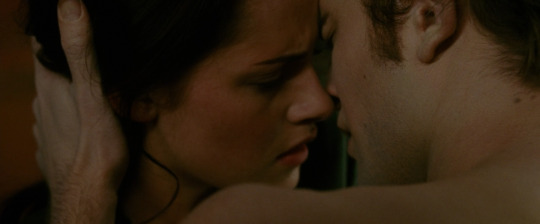
New Moon is my least favorite in the series. Even as a hardcore fan, I feel that New Moon had a slower dialogue and tone than any of the other films, and the relationship between Bella and Jacob isn’t well developed enough at first watch. I feel like they just showed us a montage of Bella and Jacob’s relationship (pre-wolf, I would say), and then it was a lot of “stay away” and “I’m not good enough for you” tropes. The film felt very repetitive and mopey, even for a Twilight film.
However, I do believe that Kirsten Stewart carried the film, despite the lack of action. She brought soul to Bella, which I don’t think was necessarily there in the first film. She allowed Bella’s character to develop, despite Edward’s absence, which I thought was very powerful.
I think New Moon, if anything, is a filler. Nothing action-packed really happens until the last forty minutes or so of the film, which, in my book, is the definition of a filler. It was a lot of moping, screaming, and Jacob being the absolute worst. (Can you tell I’m team Edward?) Overall, New Moon is the worst film of the saga, as it lacks action, promise, and ultimately, a storyline.
Overall rating: 4/10

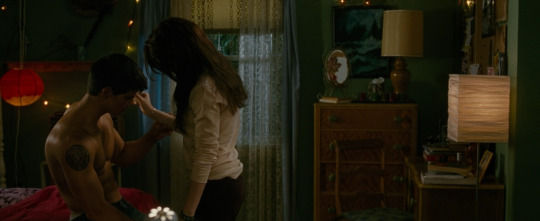
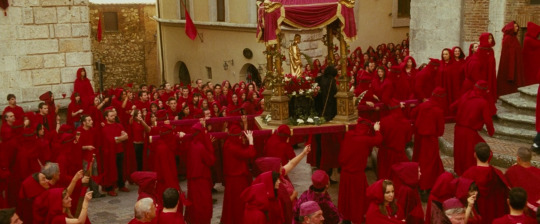
#twilight#twilight new moon#thetwilightsaga#stephanie myer#chris weitz#bella swan#edward cullen#alice cullen#jacob black#rosalie cullen#jasper cullen#emmett cullen#kirsten stewart#robert pattinson#taylor lautner#2000s movies#2000s childhood#2000s web#2000s nostalgia#2000s internet#2000s core#2000s aesthetic#2000s films#2000s actors#filmreview#film#movies#moviereview#movie#vampire
4 notes
·
View notes
Text
The Twilight Saga: Twilight (2008)
Starring: Kristen Stewart, Robert Pattinson, Taylor Lautner, Nikki Reed, Ashley Greene, Kellan Lutz, Jackson Rathbone, Peter Facinelli, Anna Kendrick, Elizabeth Reaser, Billie Burke, Christian Serratos, Rachelle Lefevre
Screenplay by Melissa Rosenberg
Directed by Catherine Hardwicke
I do not own any of the pictures posted.
SPOILERS AHEAD
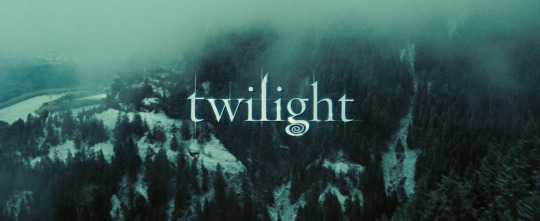
First of all, you have no idea how excited I am to finally be reviewing this. (I have popcorn!)
Twilight may perhaps be one of the most recognizable films of the early 2000s vampire craze. Now, whenever someone mentions the word Vampire I immediately think of Twilight. (Also The Vampire Diaries, but that’s a story for another day.)
Twilight follows seventeen-year-old outcast Isabella “Bella” Swan, after her relocation to Forks, Washington, from Phoenix, Arizona to live with her father, Charlie. Charlie is the towns’ police chief, while her mother, Renee, is married to a minor league baseball player named Phil.
After the move, Bella becomes reunited with childhood friend Jacob Black, a Native American teenager living with his father, Billy on the Quileute Indian Reservation near Forks. Bella soon makes friends at her high school but is drawn to the aloof and quiet Cullen siblings consisting of Alice, Jasper, Rosalie, Emmett, and the famous Edward Cullen. She is seated next to Edward in biology, to which he acts almost repulsed by her. After the Cullens are absent from school for a week, Edward returns to class and socializes with Bella. A couple of days later, an out of control driver nearly crashes Bella in the school parking lot, but Edward instantly covers a distance by thirty or so feet in order to prevent the van from striking her. After arriving at the hospital, Edward refuses to explain his actions to Bella, ultimately warning her against being friends with him. Jacob then informs Bella of the long-standing rivalry between the Cullens and the Quileutes and that the Cullen family is not allowed on the reservation.
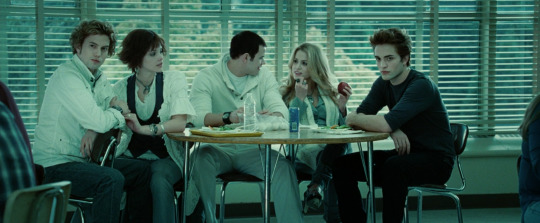
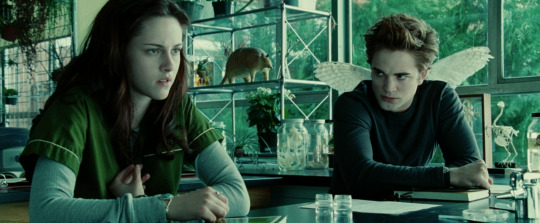
Bella then begins to research Edward’s condition, ultimately concluding that he is a vampire. He confirms this but pleads with Bella that he and his family only consume animal blood. They soon fall in love, and Edward introduces Bella to his family, where she meets Carlisle, the family father, and a doctor at Forks Hospital, Esme, the family mother, and their formally adopted children Alice, Jasper, Rosalie, and Emmett. The family’s reaction to Bella is generally positive except for Rosalie’s, who fears that her family’s secret can now be exposed.
Bella and Edward’s relationship is soon jeopardized when James, Victoria, and Laurent, three nomadic vampires arrive in Forks territory. They are responsible for a series of attacks leading up to and in the Forks territory. James, who’s described as a tracker vampire with incredible hunting instincts, is consumed by Bella’s scent and becomes obsessed with hunting her. Edward and the other Cullens protect Bella, but James ultimately tracks her to Phoenix, Arizona, where she’s hiding with Jasper and Alice. James lures Bella into her old ballet studio as a trap, attacking Bella and infecting her with vampire venom. Edward arrives and fights James, subduing him until the other Cullens arrive. Alice, Jasper, and Emmett kill James, decapitating and burning him.
In the aftermath, Bella suffered a broken leg and is hospitalized. Edward accepts Bella’s invitation to their high school prom, where he refuses her request to turn her into a vampire. They are unaware that Victoria, James’ lover, is secretly watching them, in schemes to avenge his death.
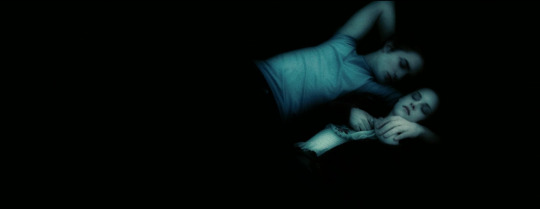
Let’s talk about Twilight as a cultural phenomenon. It pleased devoted fans to the novel series, while also defining an early generation of the vampire-romance genre. I was five when the first Twilight movie was released, so it was never a huge part of my life growing up. However, I do remember the cultural aspect of the films. I remember going to the mall in the mid-2000s and seeing posters and pictures for it everywhere. Twilight, like it or not, was everywhere from 2008 to 2012 and has experienced a surge in popularity since Stephanie Myer’s release of Midnight Sun, which is Twilight told from Edward’s perspective.
If you couldn’t already tell, I’m a huge fan of Hardwicke’s directing style. I think if she continues to direct the following Twilight films, New Moon, Eclipse, and Breaking Dawn 1 & 2. I would have enjoyed the later movies as much if not more if I enjoyed the first one. However, that’s not to say that I don’t enjoy the series as a whole. I think it truly defined the early-mid 2000s, and the nostalgia of the movie I think is more remembered than the actual story.
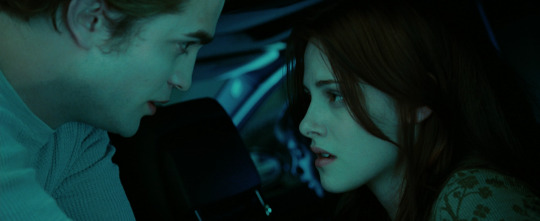
My friends and I still have Twilight marathons to this day. Do I think it’s deep? No. It’s about a girl falling in love with a 108-year-old vampire, of course, it’s not deep. Plus, the film, novels, and the story are directed at teenage girls, who of course back then, couldn’t possibly understand the complexity of a well-written and well-developed script. Do films have to be deep in order to enjoy them? No, absolutely not. I think that most of the people who heavily critique Twilight think that it needs to be deep in order to be enjoyable. Twilight, in no shape or form, I think claims to be deep. I think it’s a cultural phenomenon, and because of that, people think it has to be the next generation-defying film that has to be good. I also think that it’s more popular to hate Twilight because it's directed toward teenage girls, and, as we’ve learned, teenage girls can’t have anything without being made fun of.
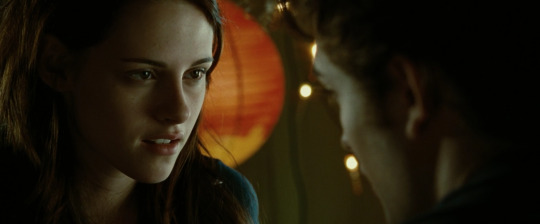
I also want to talk about Bella’s plainness. When I see critiques on Twilight or Bella’s character in general, said critiques typically argue that Bella’s lack of personality in the films (and book) is a major turn-off. I agree that she’s plain, but I don’t agree that she’s a major turn off when it comes to my love for Twilight and the saga as a whole. Truthfully, she was designed to be a plain and somewhat modest teenage girl. Everyone around her, especially her friends, are full of life, while she is frankly dull. She is one of those characters that is written to coincide with another, that being Edward Cullen.
In my perspective, they are two sides of the same coin. For example, Bella believes that she has nothing to live for, while Edward is pushing and pushing her to live and have the life he never got to live. Bella is extremely realistic for a teenage girl, honestly. Her “normal” attributes make Edward seem more desirable and God-like. I think it's time we stop picking on the “boringness” of characters written for and about teenage girls, mostly because I think it's just another thing that young girls can be put in a box for. If they’re not interesting or captivating enough for a certain audience, they’re plain and dull and lifeless. If they’re too interesting or captivating, there’s always something wrong with them (hence the manic pixie dream girl trope). Bella, I believe is written against that trope, and that is why she’s boring.
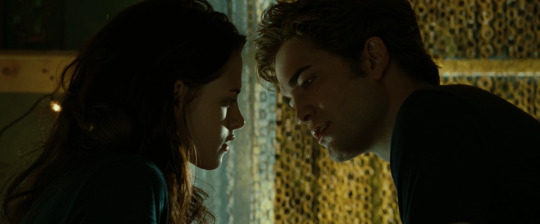
I enjoy Twilight. I do. And I’m not ashamed of it. I don’t think every movie has to be life-changing to be defined as a cultural phenomenon, or even enjoyable. I think when people say that Twilight is “bad” we have to ask ourselves what a “bad” movie is. “Bad” and “good” is completely subjective to who is watching it. As a teenage girl in my life right now, I enjoy watching Twilight. Truth be told, I like the story, and I like the nostalgia attached to it.
I wonder if my feelings would be different if I was a teenage girl in 2008 when the Twilight film was first released. I wonder if I would hate it because I was told to hate it, or if I would like it because it’s something that I enjoy. Nonetheless, the first Twilight film will always have a special place in my nostalgic little teenage girl heart, everything from Bella’s bleak green and purple bedroom to the clearness of the Cullen's barely used kitchen.
Overall rating: 9/10 (For the nostalgia, of course.)
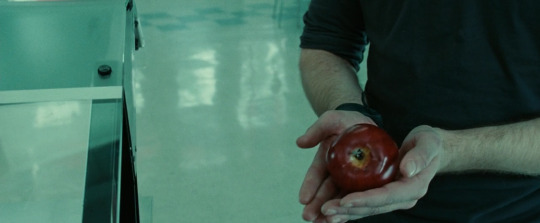
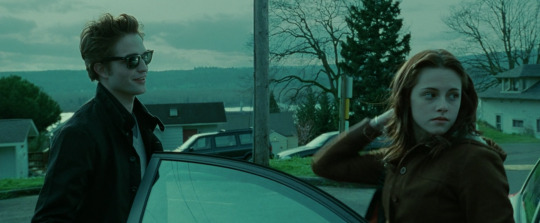
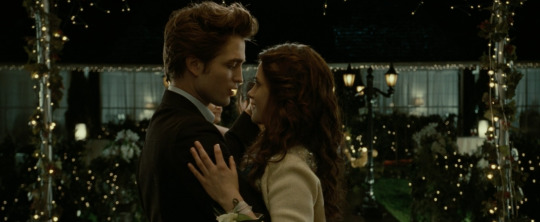
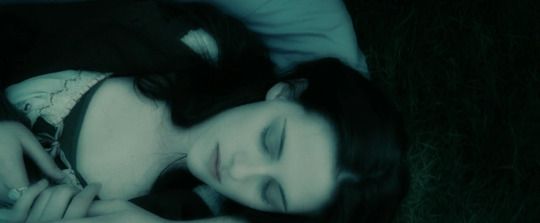
#twilight#thetwilightsaga#stephanie myer#catherine hardwicke#bella swan#edward cullen#alice cullen#jasper cullen#rosalie cullen#emmett cullen#kirsten stewart#robert pattinson#2000s movies#2000s core#2000s nostalgia#2000s web#2000s#2000s aesthetic#2000s films#filmreview#film#vampire#moviereview#movies#americanmovies#female directed movies#female film directors#female filmmakers#novel#twilight books
20 notes
·
View notes
Text
The Perks of Being a Wallflower (2012)
Starring: Emma Watson, Logan Lerman, Ezra Miller, Mae Whitman, Nina Dobrev, Paul Rudd, Johnny Simmons, Kate Walsh, Dylan McDermott, Nicholas Braun, and Melanie Lynskey
Screenplay by Stephen Chbosky
Directed by Stephen Chbosky
Cinematography by Andrew Dunn
I do not own any of the photos posted.
SPOILERS AHEAD
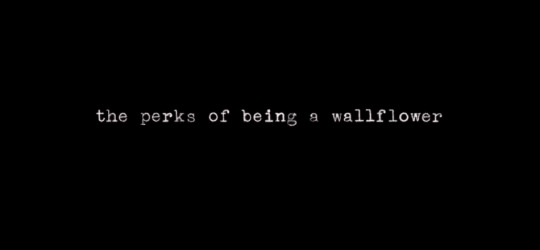
First of all, I want to say that I love this book. I read it once about every couple of months, and I find something new in it every time I read it.
The Perks of Being a Wallflower is a coming-of-age film written and directed by Stephen Chbosky. The film is told, like the book, in a series of letters written by Charlie to an unknown recipient. These letters include his triumphs and tribulations of his freshman year of high school. The films depict his mental struggles and his journey with his friends, Sam and Patrick.
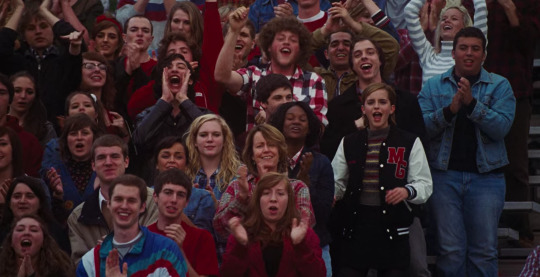
After meeting the well-rounded seniors Sam and Patrick at a football game, they invite him to a party. At said party, Charlie accidentally consumes a weed brownie and tells Sam that his best friend committed suicide. He also walks in on Patrick and the school’s quarterback Brad, kissing, to which Patrick tells Charlie that Brad is closed. Both Sam and Patrick then drive Charlie home and experience the infamous tunnel scene, which is possibly one of the most memorable scenes in the film.
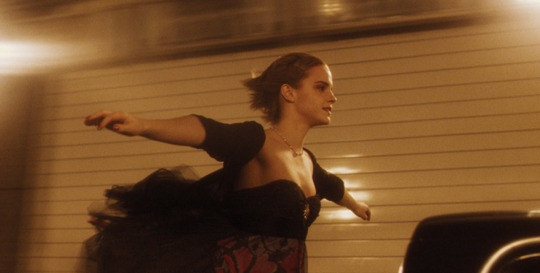
As the film progresses, Charlie slowly develops feelings for Sam and tells her on multiple occasions. Sam, however, has a boyfriend in college named Craig. Charlie later confesses to Sam that he’d never been kissed, and Sam tells him that his first kiss should be with someone who loves him, and ultimately ends up kissing him.
Charlie later begins a relationship with Sam’s friend Mary Elizabeth after the Rocky Horror Picture Show, while still having obvious feelings for Sam. At a party, Charlie is dared to kiss the prettiest girl in the room by Patrick, to which he ends up kissing Sam instead of Mary Elizabeth, upsetting them both. Patrick advises Charlie to distance himself from everyone for a little while, and he ends up in isolation and deep depression.
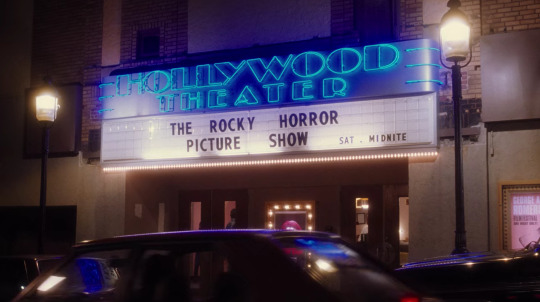
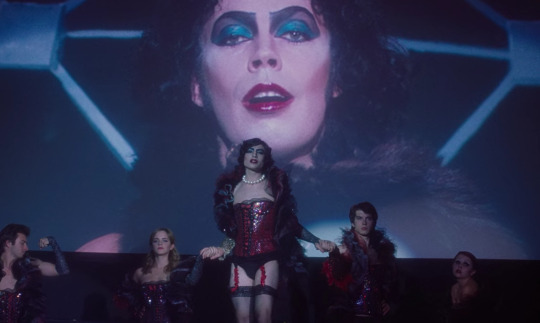
When Charlie returns to school, he notices that Brad shows up with bruises on his face after being caught having sex with Patrick by his father. He claims he was jumped, and begins to distance himself from Patrick, calling him a f*ggot. Patrick punches him, and Brad’s friends begin beating on him until Charlie intervenes and blacks out. After recovering, he finds that Brad’s friends are incapacitated, while his hands are bruised from fighting. Sam and Patrick express gratitude towards Charlie, seemingly forgiving him for past events. However, after blacking out, Charlie’s mental state begins to worsen and worsen.
TW: sexual assault
Patrick then kisses Charlie and immediately apologizes. Sam is accepted into Pennsylvania State University, and breaks up with her Craig after learning of his faithfulness. The night before she leaves for college, her and Charlie confide in each other, and he experiences flashbacks of his Aunt Helen, his aunt who died in a car crash when he was seven. After Sam leaves for college the next morning, Charlie’s mental state deteriorates, and his flashbacks become more and more apparent. He blames himself for his aunt’s death, and is later committed to a mental hospital where it is revealed that she sexually abused him.
The film ends with Sam, Patrick and Charlie revisiting the tunnel where Sam has revealed she has found the perfect tunnel song–“Heroes” by David Bowie. Sam kisses Charlie, and he stands up on the back of the truck, acknowledging that he feels alive with the statement “We are infinite.”
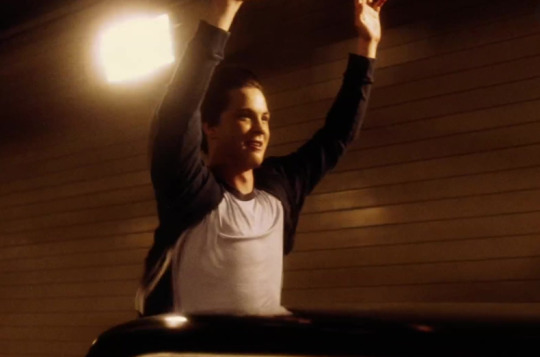
As someone who's both read The Perks of Being a Wallflower and seen the film, it’s difficult to separate the materials into their own entities, despite being the same story. The casting is near perfection, as I couldn’t imagine anyone besides Emma Watson playing Sam and Ezra Miller playing Patrick. They both deliver a stellar performance, as did Paul Rudd with Mr. Anderson, and Mae Whitman as Mary Elizabeth.
The film allows Emma Watson to shed her ten year Harry Potter skin, in a role that I don’t think could’ve been more perfect for her. It allows Ezra Miller some dimension when compared to his character in We Need To Talk About Kevin.
I want to talk about Sam and the “manic pixie dream girl” stereotype that is often placed on her, mostly because I don’t think she fits any of the characteristics. I recently wrote an essay about strong female characters being overtaken by this craize of the “manic pixie dream girl,” to which I discussed her character, and how I think that she is not solely there for Charlie’s gain and fixation (as many characters with manic pixie dream girl syndrome are.) I think her character separation from Charlie is more prevalent in the book, as I believe that her character on paper is more determined to be seen as separate from the people around her. She isn’t there solely to fix Charlie, or anyone around her for that matter. She has dreams and ambitions, and her own goals away from Charlie. She grows as a character, but not at Charlie’s, or any other male character's expense. She is her own person, or character, rather it be.
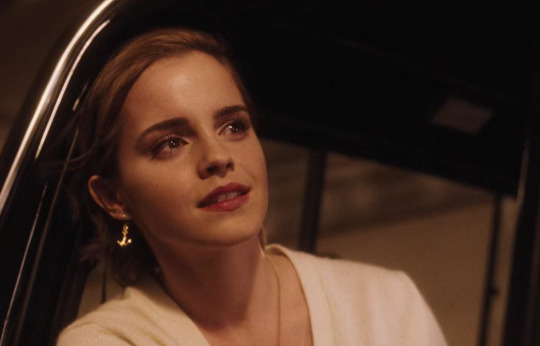
Let’s talk about the soundtrack, which I think truly brought The Perks of Being a Wallflower to life from paper to screen. From my perspective, many of those who watch the film now associate certain songs with certain scenes, like “Come on Eileen” with Sam and Patrick dancing, or “Heroes” with the tunnel scene. For one, I think that replacing Fleetwood Mac’s “Landslide” for David Bowie’s “Heroes'' made the tunnel scene absolutely magical, more than the book could ever do. I think the tunnel scene made the movie stand out, while the tunnel scene in the book was what I remember being as words on paper. I couldn’t see the scene in my head, whereas the film depicted a version that I believe to be more memorable than the film as a whole itself. Other notable mentions I would like to include would be the song “Could it Be Another Change?” and “Teen Age Riot,” which I think were perfect selections for the feel of the film.
I would categorize this film as a teenage classic (I know, big words) mostly because I think so many teenagers relate to it. It’s funny and charming, but also at times it allows the viewer to think and reflect about what’s happening around them. The film allows a break from reality, but not a complete severe that doesn’t allow one to stay grounded. I also, for another pointer, think the soundtrack is phenomenal.
That being said, do I think that the film is better than the book? No. A hundred times no. Do I detest the film? No. I don’t. I think it’s a extraordinary adaptation, and I think that it’s so extraordinary because it’s written and directed by Chbosky himself. He created real characters, both on paper and on screen, that allowed many of the viewers to see themselves in the film. He allowed the viewers to (forgive me) feel infinite. Which, in turn, is all anyone truly wants, to feel completely and utterly infinite.
Overall rating: 8/10
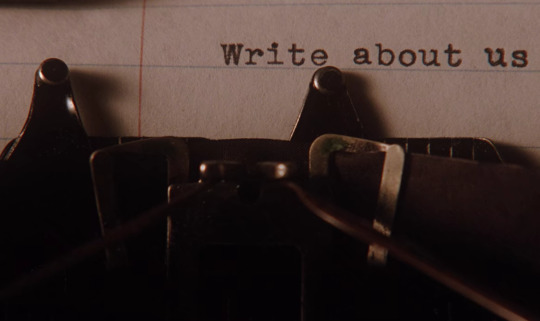
#the perks of being a wallflower#theperksofbeingawallflowerbook#theperksofbeingawallflowermovie#emma watson#ezra miller#logan lerman#stephen chbosky#moviereview#filmreview#2010 film#2012#2010s#early2010s#2010s movies#theperksofbeingawallflower#director#film#movie#movies#we are infinite
104 notes
·
View notes
Text
Thirteen (2003)
Starring: Nikki Reed, Evan Rachel Wood, Holly Hunter, Kip Pardue, Jeremy Sisto, and Vanessa Hudgens
Screenplay by Nikki Reed and Catherine Hardwicke
Directed by Catherine Hardwicke
Cinematography by Elliot Davis
I do not own any of the photos posted.
SPOILERS AHEAD
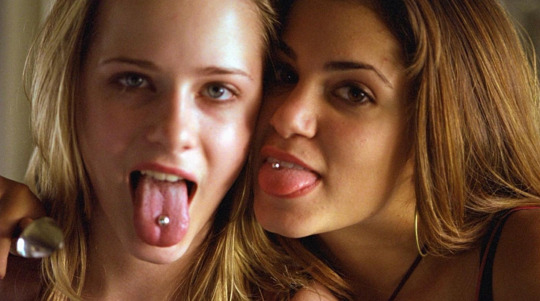
Thirteen is a cautionary tale about a teenage girls transition from an honor roll student to a drug addiction coping lifestyle.
The film begins with two teenage girls sitting on a bed and heavily ingesting drugs that dull their sensitivity to pain. The girls begin to laugh hysterically as they violently hit each other and are on the brink of passing out. The film, set in Los Angeles, jumps back to four months earlier to introduce Tracy Freeland, presenting her as a “good girl” figure. She then meets Evie Zamora, who soon influences her behavior to the point of distortion. The girls soon begin a destructive lifestyle of sex, drug use, and petty crime.
Tracy, tired of the negative attention, begins to wear new and trendy clothes to school. She catches the eye of Evie, who invites her to shop with her on Melrose and gives her a fake phone number in the process. Tracy, determined to befriend Evie, finds her shopping on Melrose and joins her. Tracy then excuses herself and precedes to steal a wallet full of cash, to which the girls have a shopping spree. This act impressed Evie, and from there on, the girls quickly became friends.
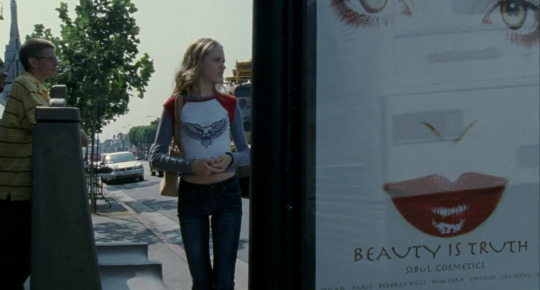
TW: self-harm
Tracy is quickly introduced to Evie’s lifestyle filled with drugs, sex, and crime. Evie then begins to stay with Tracy and her family, telling her mother that her adult guardian is out of town for two weeks. Evie then discovers that Tracy regularly indulges in self-harm to cope with stress. Tracy’s mother, Melanie, is concerned but cannot find a way to intervene in her daughters soon sparing lifestyle. As Evie and Tracy become closer, Melanie is shut more and more out of Tracy’s life.
The film begins to show Tracy and Evie’s increasingly destructive behavior, with them both egging each other on. They try to seduce Tracy’s neighbor Luke, a man in his early twenties, and ditch a family movie night to get high on Hollywood. This is, what I believe to be, the inevitable start of Tracy’s downfall.
Evie soon extends her stay, and Melanie's increasing concern for Tracy pushes her to contact Evie’s guardian, Brooke, who was hiding from a botched plastic surgery. Evie asks Melanie to formally adopt her, but Melanie refuses, and Tracy stands idly by, somewhat agreeing with her mother. After this, Evie turns all of Tracy’s friends against her, and Tracy slowly begins to realize the consequences of her behavior when she is told she will have to repeat the seventh grade.
When Tracy arrives home from school, she is confronted by Evie, Brooke, and Melanie Brooke confronts Tracy about her habits of stealing and drug use, claiming that she influenced Evie to no end. Angry, Tracy claims that Evie instigated their behavior, and Brooke pulls up her sleeve to show her self-harm scars. Tracy and Melanie then collapse on each other, with Melanie refusing to let go of Tracy’s arms. The film ends with a dream sequence of Tracy screaming and spinning on a mary-go-round.
The film depicts the perils about being a teenager. I think one of the most noticeable things about the film is Tracy’s change, and the coloring that falls behind it. At the start of the film, Tracy is in what is described as “cabbage patch clothes” and her spirit is high, as is the coloring. As the film progresses, the coloring slowly begins to fade into a green-ish blue hue, depicting her downfall and loss of childhood innocence.
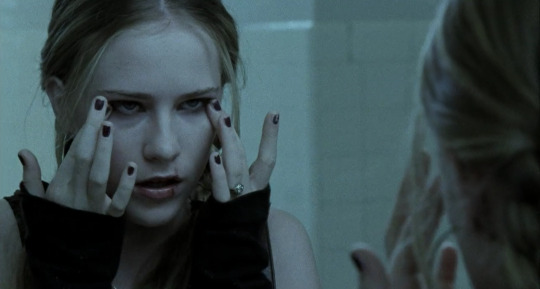
At the time of its release, Thirteen did gain some criticism for heavy drug use, sex, and self harm. However, to pretend that teenagers do not partake in drug use, sex, and self harm, may do more harm than good. To pretend that something doesn’t exist, does not make it go away.
I think that’s what Catherine Hardwick was going for. Throughout Tracy’s downfall, her mother was clueless, but not uncaring. The mother, in a sense, did not have any clue as to how to help her daughter, so to her disdain, she watched as her daughter fell deeper and deeper into a seemingly never-ending spiral. It’s important that there are some films on the real aspects of adolescence, so we can better understand what teenagers go through. Like anything, it’s important that both the negative and positive aspects are shown in order to gain a well-rounded perspective.
This movie showed the worst years of a young girl's life on full blast. It's a nightmare to watch for many parents, but I believe many teenagers as well. These girls, like many teenagers, want to come in contact with danger without getting hurt. They want to take risks and live, but how much risk taking is enough?
I think this film was hauntingly accurate to a lifestyle that many teenagers partake in, or even go through. That’s why I think it’s important to watch. Films help us escape reality, but at some points, we as viewers need to be grounded. We need to be told “this can really happen” or “this did happen.”
Was Tracy’s downfall inevitable? What does this movie say about teenagers in the early 2000s? Or teenagers that watch it today? Thirteen is haunting, eerie, and incredibly realistic, and that's why it’s one of the most important films to watch.
Overall rating: 9.5/10
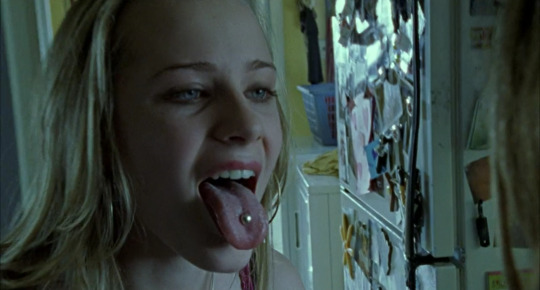


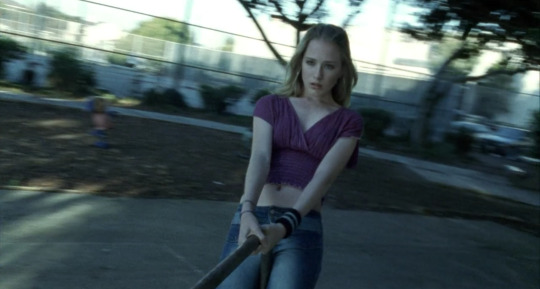
#thirteen#thirteenmovie#thirteen movie#catherine hardwicke#nikki reed#evan rachel wood#2000s#2000s movies#2000s childhood#2000s nostalgia#2000s web#2000s fashion#tracy freeland#evie zamora#movies#moviereview#americanmovies#film#2000s films#2000s aesthetic#2003#2003 aesthetic#2003 movie#2003 fashion#female directors#female directed films#female directed movies#2000sdirectors
139 notes
·
View notes
Text
The Virgin Suicides (2000)
Starring: Kirsten Dunst, A.J. Cook, Hanna R. Hall, Chelse Swain, Leslie Hayman, Josh Hartnett, Hayden Christensen, Robert Schwartzman, Lee Kagan, Kathleen Turner, James Woods, Jonathan Tucker, Joe Dinicol, Giovanni Ribisi, Michael Pare, Scott Glenn, and Danny DeVito
Screenplay by Sofia Coppola
Directed by Sofia Coppola
Cinematography by Edward Lachman
I do not own any of the photos posted.
SPOILERS AHEAD
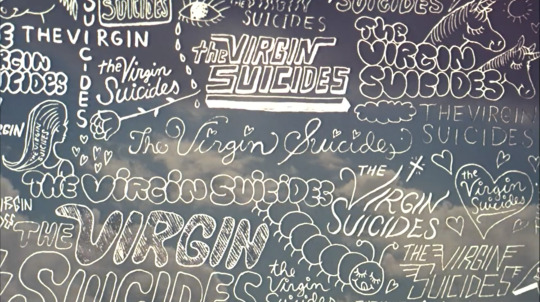
This film is not about who the Lisbon girls were. The film was about the perspective in which the teenage boys saw them.
Sofia Coppola’s directorial debut The Virgin Suicides is a dreamy and whimsical perspective of teenage and religious escapism. The Virgin Suicides is narrated by an adult who speaks for the boys in a Michigan suburban neighborhood 25 years after the suicides of the Lisbon girls–Therese, Mary, Bonnie, Lux, and Cecelia. These boys, who remain anonymous throughout the film, are mesmerized by the Lisbon girls.
Cecelia, the youngest of the girls, is the first to go. After attempting suicide by slitting her wrists in the bathtub and later succeeding by jumping from her second-story window onto a fence below, the Lisbon girls, as their parents notice, slowly began to fade.
Lux is perhaps the most dazzling of the sisters, and also the most rebellious. When school begins, she begins a secret romance with school heartthrob Trip Fontaine, who negotiates with the strict Mr. and Mrs. Lisbon in order to take Lux and her sisters to the school homecoming dance. After Lux and Trip win homecoming king and queen, Trip convinces Lux to take a walk with him on the football field, where she ultimately ends up losing her virginity. Trip abandons Lux in her sleep thereafter, and they never speak again. She wakes up alone, in the middle of the school’s football field, breaking curfew. Trip, the adult narrator states, “I liked her a lot. But out there on the football field, it was different.” Trip ultimately decided to leave because the sex was not what he had imagined for both him and Lux. She wakes up the next morning to take a taxi home.
After this, the girls are confined to the walls of their bedrooms by their parents. The boys watch them through a telescope, and communicate with them through morse code and later a telephone. There are many beautiful shots of the girls lying in their rooms, reading, talking, and communicating with the neighborhood boys. This is when the girls are no longer themselves, but instead what the boys view them as. These scenes are beautiful because the boys see their beauty, more than anything else.
TW: suicide
The boys later visit the house as directed by the girls through a letter, and speak to Lux. They are invited inside under the presumption that they are to help the girls’ escape and begin to start exploring out of curiosity. They stumble across Bonnie’s hanging body in the basement and begin to flee. The boys then encounter a dead Mary in the kitchen and realized that the girls had made a suicide pact. The girls’ death symbolized who they were. Bonnie had hanged herself, Mary had stuck her head in the gas oven, Therese had overdosed on sleeping pills, and Lux had died of carbon monoxide poisoning by sealing the garage shut and leaving the engine running. They each died in different ways, and by different attempts, but in the end, they all ended up in the same place. It shows that each of the girls was different, but ultimately, were viewed as the same by those who they encountered.
I think this film is remembered for its beauty rather than the actual story. The girls’ mother is a hysteric Catholic terrified of her daughters’ budding sexuality that she adds cloth to their homecoming dresses until they appear as “four identical sacks.” Their father has good means when it comes to the girls, but is ultimately useless for the girls’ wellbeing. However, I do not believe this is what drove the girls to their death.
The boys never truly saw the girls for who they were. They never saw their pain and emotional torment from their isolated home life. The boys saw the Lisbon girls as unflawed and perfect creatures, which is what they’re depicted as in the film.
Sofia Coppola is content with the means of mystery when it comes to her films. Because we have an unreliable narrator that tells the story of the Lisbon girls, we can never truly know why they committed suicide. The lack of explanation is the whole point of the story: the girls were never truly known for who they were, but instead what they were ultimately viewed as; perfection.
The film is beautiful over everything else because the boys saw nothing but the Lisbon girls’ beauty. Even in Cecelia’s death and the remaining girls’ suicides, it was beautiful because that’s what the story truly is. The story is tedious and captivating, but not entirely real, just like the girl’s lives.
This is not to say that the girls’ aren’t real nonetheless, they are instead a form of idealism that encaptured the boys around them. That’s why I believe the film is beautiful and encapsulating, not only because that’s what the Lisbon girls’ were viewed as, but even in death, that’s what they were.
Overall rating: 8/10
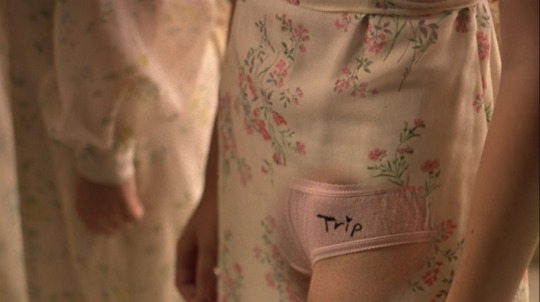
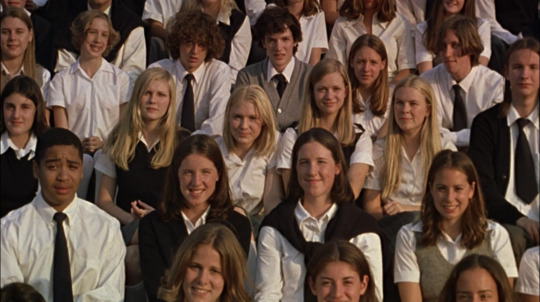
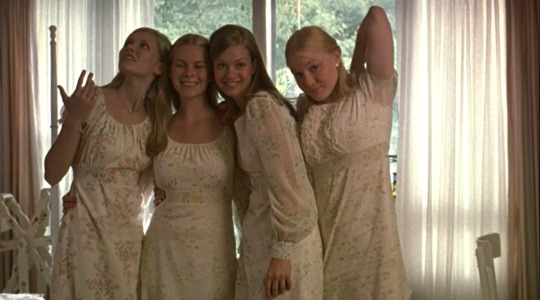
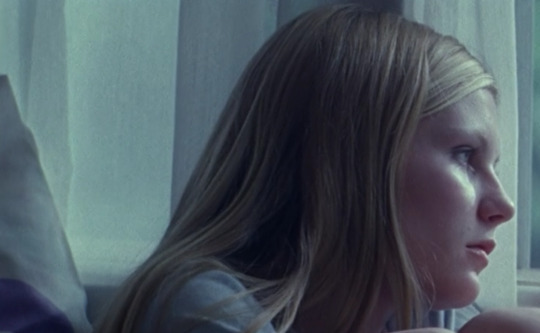
#thevirginsuicides#film#filmreview#2000s#2000s movies#1970s aesthetic#sofia coppola#sofiacoppola#sofia coppola films#sofia coppola movie review#movies#moviereview#americanmovies#lux lisbon#bonnielisbon#marylisbon#thereselisbon#female directed movies#female filmmakers#female film directors#femalemoviemakers
100 notes
·
View notes